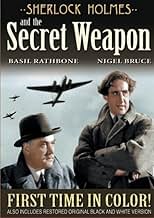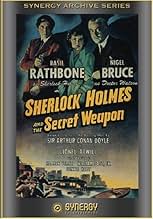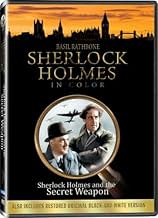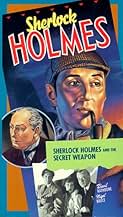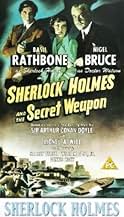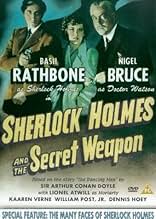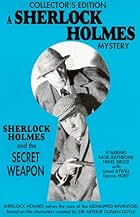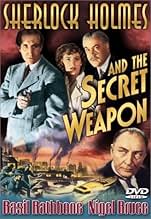Sherlock Holmes et l'Arme secrète
Original title: Sherlock Holmes and the Secret Weapon
- 1942
- Tous publics
- 1h 8m
IMDb RATING
6.5/10
7.1K
YOUR RATING
Sherlock Holmes and Doctor Watson must protect a Swiss inventor of an advanced bomb sight from falling into German hands.Sherlock Holmes and Doctor Watson must protect a Swiss inventor of an advanced bomb sight from falling into German hands.Sherlock Holmes and Doctor Watson must protect a Swiss inventor of an advanced bomb sight from falling into German hands.
Karen Verne
- Charlotte Eberli
- (as Kaaren Verne)
Rudolph Anders
- Braun
- (uncredited)
Ted Billings
- Barfly
- (uncredited)
Whit Bissell
- London Bobbie
- (uncredited)
Veda Ann Borg
- Bar Singer
- (voice)
- (uncredited)
Paul Bryar
- Swiss Waiter
- (uncredited)
John Burton
- RAF Officer
- (uncredited)
Vicki Campbell
- Woman RAF Pilot
- (uncredited)
Gerard Cavin
- Scotland Yard Man
- (uncredited)
Harry Cording
- Jack Brady
- (uncredited)
James Craven
- RAF Officer Watching Bombsight Test
- (uncredited)
Featured reviews
Sherlock Holmes (Basil Rathbone) smuggles a Swiss inventor of a new bombsight into England and out of Nazi hands. But when the inventor is kidnapped right from under the nose of Scotland Yard, Holmes discovers it's not just the Nazis he has to contend with but his old nemesis Professor Moriarty (Lionel Atwill) as well.
The second in Universal's highly enjoyable Sherlock Holmes series is also the first directed by Roy William Neill, who would direct every Universal Holmes film after this. This is also the first appearance of Inspector Lestrade (Dennis Hoey), a pleasant addition to the series. Rathbone and Nigel Bruce are excellent, as usual. Rathbone gets to dress up in a few disguises, which are fun. He's still sporting that silly haircut from Voice of Terror. Lionel Atwill is a good Moriarty. Not the series' best but still very good. Any movie that features Basil Rathbone vs Lionel Atwill is one where you will be entertained.
For some reason, as with other WWII Holmes movies, a lot of reviewers seem to really hate the idea of Sherlock Holmes fighting against the Nazis or for England. They claim Holmes was never intended for "propaganda" and that he should be left to simple detective stories. Someone should have told Sir Arthur Conan Doyle that when he wrote "His Last Bow," a WWI-era story which saw Holmes helping his country catch German spies.
The second in Universal's highly enjoyable Sherlock Holmes series is also the first directed by Roy William Neill, who would direct every Universal Holmes film after this. This is also the first appearance of Inspector Lestrade (Dennis Hoey), a pleasant addition to the series. Rathbone and Nigel Bruce are excellent, as usual. Rathbone gets to dress up in a few disguises, which are fun. He's still sporting that silly haircut from Voice of Terror. Lionel Atwill is a good Moriarty. Not the series' best but still very good. Any movie that features Basil Rathbone vs Lionel Atwill is one where you will be entertained.
For some reason, as with other WWII Holmes movies, a lot of reviewers seem to really hate the idea of Sherlock Holmes fighting against the Nazis or for England. They claim Holmes was never intended for "propaganda" and that he should be left to simple detective stories. Someone should have told Sir Arthur Conan Doyle that when he wrote "His Last Bow," a WWI-era story which saw Holmes helping his country catch German spies.
Sir Arthur Conan Doyle wrote a fair number of Sherlock Holmes accounts but the popularity of the famous detective insured that sequels in both print and on film would extend far beyond the author's works.
In "Sherlock Holmes and the Secret Weapon," Holmes, Basil Rathbone, patriotically serves British intelligence in order to secure a Swiss scientist's desperately needed bombsight. The film is from 1942 and I wonder if the producers and writers realized how vital bombsight secrets were (the American Norden bombsight was guarded almost as zealously as the new radar sets that would change the course of World War II).
Holmes and his faithful but expectedly bumbling companion, Dr. Watson, Nigel Bruce, battle Dr. Moriarty, Lionel Atwill. As evil as Moriarty has always been it's a bit of a shock to see he's signed up with Hitler. Has the man no vestige of decency? I guess not. But Atwill is deliciously evil.
The story is reasonably fast-paced as Holmes and Watson seek to recover stolen bombsight components before they can be delivered to a U-boat. Rathbone is his usual suave self and several Holmsian disguises are well carried out.
This and other 1940s Holmes stories are now available on DVD and oldies.com has put out a very nice four-disc set in a wooden box: this film is included along with a bonus CD of an interview with the aged Doyle. The set retails for about $26 in major DVD and CD stores but I found this and other sets from oldies.com at a warehouse club for $14.98. The transfers are very good.
Very nice and relaxing late night viewing.
7/10.
In "Sherlock Holmes and the Secret Weapon," Holmes, Basil Rathbone, patriotically serves British intelligence in order to secure a Swiss scientist's desperately needed bombsight. The film is from 1942 and I wonder if the producers and writers realized how vital bombsight secrets were (the American Norden bombsight was guarded almost as zealously as the new radar sets that would change the course of World War II).
Holmes and his faithful but expectedly bumbling companion, Dr. Watson, Nigel Bruce, battle Dr. Moriarty, Lionel Atwill. As evil as Moriarty has always been it's a bit of a shock to see he's signed up with Hitler. Has the man no vestige of decency? I guess not. But Atwill is deliciously evil.
The story is reasonably fast-paced as Holmes and Watson seek to recover stolen bombsight components before they can be delivered to a U-boat. Rathbone is his usual suave self and several Holmsian disguises are well carried out.
This and other 1940s Holmes stories are now available on DVD and oldies.com has put out a very nice four-disc set in a wooden box: this film is included along with a bonus CD of an interview with the aged Doyle. The set retails for about $26 in major DVD and CD stores but I found this and other sets from oldies.com at a warehouse club for $14.98. The transfers are very good.
Very nice and relaxing late night viewing.
7/10.
Sherlock Holmes (Basil Rathbone) and Dr. Watson (Nigel Bruce) have been hired by the British government to protect a Swiss scientist Dr. Franz Tobel (William Post Jr.). He has a bomb that the British want to win the war. Unfortunately the evil Dr. Moriarty (Lionel Atwill) is working with the Nazis and will stop at nothing to get the doctor--and his invention.
Moving Sherlock Holmes to the 1940s sounded like a stupid idea but it does work for one reason--Basil Rathbone. Arguably he is the BEST Sherlock Holmes ever put on the screen. He plays the character so well (and accurately) that it doesn't matter what era he's solving crimes. As for Nigel Bruce as Watson...everybody has problems with it. He plays Watson as a bumbling old fool...that is NOT the Watson of the books. You seriously wonder why Holmes puts up with him. Still, he does grow on you (in a way). Then there's Atwill having a whale of a time playing Moriarty--the discussions and battle of wits between him and Holmes are just great! I've never liked Dennis Hoey as Inspector Lestrade--he's such an idiot. Makes Watson look like a genius. And Post Jr. is pretty good as Tobel (even though his accent amusingly keeps changing!).
This movie is done elaborately and runs only a little over an hour. Still, it does have it's slow spots and I never understood the secret code section.
Still, worth catching if just for Rathbone and Atwill.
Moving Sherlock Holmes to the 1940s sounded like a stupid idea but it does work for one reason--Basil Rathbone. Arguably he is the BEST Sherlock Holmes ever put on the screen. He plays the character so well (and accurately) that it doesn't matter what era he's solving crimes. As for Nigel Bruce as Watson...everybody has problems with it. He plays Watson as a bumbling old fool...that is NOT the Watson of the books. You seriously wonder why Holmes puts up with him. Still, he does grow on you (in a way). Then there's Atwill having a whale of a time playing Moriarty--the discussions and battle of wits between him and Holmes are just great! I've never liked Dennis Hoey as Inspector Lestrade--he's such an idiot. Makes Watson look like a genius. And Post Jr. is pretty good as Tobel (even though his accent amusingly keeps changing!).
This movie is done elaborately and runs only a little over an hour. Still, it does have it's slow spots and I never understood the secret code section.
Still, worth catching if just for Rathbone and Atwill.
It was an interesting enough idea, I suppose, to set a series of Sherlock Holmes films in the "modern day"...at the time, the WWII era...but those who are familiar with the first two Rathbone/Bruce films might be thrown off by it. When the rights passed from Fox to Universal, the two stars were retained, but apparently our two heroes stepped through a hole in the space-time continuum. The Fox films were Victorian period pieces, whereas Universal took the opportunity to utilize Sherlock Holmes in the series of modern-day B-movies into which this entry falls, several of which were fairly standard wartime propaganda...pretty much the order of the day for Hollywood films circa 1942-1945.
While the film may boast some entertainment value, the plot is actually quite silly. Sherlock Holmes (sporting a remarkably bad haircut) has been charged with the task of guarding Dr. Franz Tobel, the inventor of a bomb sight (which, when you see it, will give you an idea of what the film's budget was) that will apparently revolutionize airborne warfare. Holmes's task is to keep Tobel safe (at which he fails) and to keep the bomb sight out of the hands of the Nazis. When Tobel is abducted, Holmes must unravel a coded message before his arch-nemesis, Professor Moriarty does. Though the credits state that the film is an adaptation of Conan Doyle's story, The Dancing Men, only the code itself is taken from said story. And a small reference to another story, The Empty House, also shows up early in the film. Apart from that, you'll find no Conan Doyle here.
Interestingly enough, what makes Tobel's bomb sight so remarkable, apart from the fact that the bombs seem to land where they're supposed to, is never expounded upon...leaving the viewer to assume that both Allied and German bomb sights were abysmally inaccurate, as both sides are clamoring to get their hands on one that actually works. Probably not the best way to bolster confidence in the Allied fighting machine...but then, logic is scarce in this outing. Holmes relies just as heavily upon chance and educated guesses as he does upon deduction, and it's the bumbling Watson (who was never bumbling in the original stories) who inadvertently provides the solution to the major stumbling block (despite the fact that the solution should have been obvious to someone as brilliant as Sherlock Holmes).
All in all, this film has its moments, but fails to live up to the legend of the world's greatest detective. Rathbone is a fine Holmes and Bruce (despite the almost unforgivable dumbing down of the Watson character) does a good job, as well. But much of the supporting cast seem to be phoning in their performances. The production values are rather noticeably low and the script is fairly ludicrous. I still watch this one from time to time, and certainly prefer it over Sherlock Holmes and the Voice of Terror (the first Universal Holmes entry)...but I can't help but think that Sherlock Holmes deserves better than this.
Interesting sidenote - This film contains the series' one and only reference to Sherlock Holmes's hypodermic cocaine usage. As Holmes is describing to Moriarty an elaborate hypothetical death scenario involving an intravenous needle, Moriarty interjects "The needle to the last...eh, Holmes?" How this managed to slip by the censors at the Breen Office (which, at the time, strictly forbade such references) is perhaps the one great mystery to be found in this film.
While the film may boast some entertainment value, the plot is actually quite silly. Sherlock Holmes (sporting a remarkably bad haircut) has been charged with the task of guarding Dr. Franz Tobel, the inventor of a bomb sight (which, when you see it, will give you an idea of what the film's budget was) that will apparently revolutionize airborne warfare. Holmes's task is to keep Tobel safe (at which he fails) and to keep the bomb sight out of the hands of the Nazis. When Tobel is abducted, Holmes must unravel a coded message before his arch-nemesis, Professor Moriarty does. Though the credits state that the film is an adaptation of Conan Doyle's story, The Dancing Men, only the code itself is taken from said story. And a small reference to another story, The Empty House, also shows up early in the film. Apart from that, you'll find no Conan Doyle here.
Interestingly enough, what makes Tobel's bomb sight so remarkable, apart from the fact that the bombs seem to land where they're supposed to, is never expounded upon...leaving the viewer to assume that both Allied and German bomb sights were abysmally inaccurate, as both sides are clamoring to get their hands on one that actually works. Probably not the best way to bolster confidence in the Allied fighting machine...but then, logic is scarce in this outing. Holmes relies just as heavily upon chance and educated guesses as he does upon deduction, and it's the bumbling Watson (who was never bumbling in the original stories) who inadvertently provides the solution to the major stumbling block (despite the fact that the solution should have been obvious to someone as brilliant as Sherlock Holmes).
All in all, this film has its moments, but fails to live up to the legend of the world's greatest detective. Rathbone is a fine Holmes and Bruce (despite the almost unforgivable dumbing down of the Watson character) does a good job, as well. But much of the supporting cast seem to be phoning in their performances. The production values are rather noticeably low and the script is fairly ludicrous. I still watch this one from time to time, and certainly prefer it over Sherlock Holmes and the Voice of Terror (the first Universal Holmes entry)...but I can't help but think that Sherlock Holmes deserves better than this.
Interesting sidenote - This film contains the series' one and only reference to Sherlock Holmes's hypodermic cocaine usage. As Holmes is describing to Moriarty an elaborate hypothetical death scenario involving an intravenous needle, Moriarty interjects "The needle to the last...eh, Holmes?" How this managed to slip by the censors at the Breen Office (which, at the time, strictly forbade such references) is perhaps the one great mystery to be found in this film.
In the Universal series of modern Sherlock Holmes stories with Basil Rathbone and Nigel Bruce, SHERLOCK HOLMES AND THE SECRET WEOPON is not one of the top films - although it is entertaining. I think the problem with it is that much of the film's "dueling" between Holmes and his nemesis Moriarty (here played by Lionel Atwill) seems to delay the actual point of the Professor's work.
Moriarty appears in three of the Holmes films with Rathbone. In THE ADVENTURES OF SHERLOCK HOLMES he was played by George Zucco, who gave real relish to the love of villainy for its own sake to the role. For my money Zucco's performance as the Professor was the best of the three (there is even a brief moment of comedy in his performance, when he's disguised as the "Sergeant of Police" towards the end - like he's preparing to sing "A Policeman's Lot" from Gilbert & Sullivan). Next comes Mr. Atwill's performance here - more of that later. Finally there is Henry Daniell's intellectual Moriarty in SHERLOCK HOLMES AND THE LADY IN GREEN. It's a typically cool, classy performance by Mr. Daniell, but his confrontations with Holmes seem to be a tedious bore to him. They keep him from completing the main plan. In the stories that the Professor pops up in, he really senses Holmes is a nemesis who will remain a danger as long as he is alive. Yet, because of the intellectual tennis match between him and Rathbone, Rathbone (in his autobiography) actually felt Daniell was the best of the film Moriartys.
If Zucco captured the love of evil in the Professor, and Daniell seemed to demonstrate the tired Oxford Don (in the stories the Professor is a well regarded mathematician, whose volume on the binomial theorem had a "European vogue", and who wrote an intriguing book, THE DYNAMICS OF THE ASTEROID), Atwill demonstrates the Professor as pragmatic businessman. First of all, he's sold his services (apparently) to Nazi Germany. This is never gone into, but one presumes (as this is before the Nazis began to really collapse) he figures they will win the war. Secondly, he is not a fool. When Dr. Tobel (William Post Jr.) has shown he is a state of near physical collapse due to the torturing of Moriarty's gang, the Professor decides to kidnap one of the other scientists who are assisting Tobel, because he's as good a scientist as Tobel and would be able to put together the bomb site. I somehow can't quite see Zucco making such a sensible decision on the spot, and if Daniell had to make it, he would seem annoyed that there is yet another delay to his plans.
By the way, one trick used in all the Holmes series regarding the Professor is how to rid the film of him. If you read the Holmes stories, Moriarty appears as the villain three times: in THE MEMOIRS OF SHERLOCK HOLMES' last story ("THE ADVENTURE OF THE FINAL PROBLEM"), in THE RETURN OF SHERLOCK HOLMES' first story ("THE ADVENTURE OF THE EMPTY HOUSE") and the last of the four novels/novellas (THE VALLEY OF FEAR). It's amazing how much mileage the Professor got out of so few appearances (he is mentioned in two or three other stories as well - in passing). But because of his fate at the Reichenbach Falls in "THE FINAL PROBLEM" and "THE EMPTY HOUSE", we always see him fall to his death. Zucco falls off the White Tower on Tower Hill. Daniell (with more imagination) tries to flee Gregson and the police, but is shot as he jumps, and wounded fails to hold on to the wall of an adjacent building. Atwill (here it is not seen, but heard) seems to fall down a trap door he's planted in an escape tunnel). It is really tedious after awhile to see the Professor always fall in these films. One turns to the Gene Wilder comedy (admittedly a comedy) SHERLOCK HOLMES' SMARTER BROTHER, wherein Leo McKern is a wonderfully wacky and villainous Moriarty (complete, finally, with an Irish accent), who is not killed at the end, but just left mulling - in a rowboat - over how his careful schemes did not work out. I rather liked that better.
The use of the "Dancing Men" code here, like the use of the "Devil's Foot Root" in DRESSED TO KILL, snags a part of a mystery from a short story. "THE ADVENTURE OF THE DANCING MEN" appeared in THE RETURN OF SHERLOCK HOLMES, and deals with a client of Holmes whose wife has been getting weird, blood-curdling messages in this code. Charles Higham, in his biography THE ADVENTURES OF CONAN DOYLE suggests Sir Arthur may have picked up the code from a magazine game in the 1870s, but we really don't know. The code is basically one of letter substitutions for the figures of the dancing men. The story in the short story is dramatic, but deals with a triangle. The only innovation in the film is that Tobel makes a slight change that confuses both Holmes and Moriarty.
The film will entertain, but I still think THE HOUSE OF FEAR, THE SCARLET CLAW, and SHERLOCK HOLMES FACES DEATH are better films.
Moriarty appears in three of the Holmes films with Rathbone. In THE ADVENTURES OF SHERLOCK HOLMES he was played by George Zucco, who gave real relish to the love of villainy for its own sake to the role. For my money Zucco's performance as the Professor was the best of the three (there is even a brief moment of comedy in his performance, when he's disguised as the "Sergeant of Police" towards the end - like he's preparing to sing "A Policeman's Lot" from Gilbert & Sullivan). Next comes Mr. Atwill's performance here - more of that later. Finally there is Henry Daniell's intellectual Moriarty in SHERLOCK HOLMES AND THE LADY IN GREEN. It's a typically cool, classy performance by Mr. Daniell, but his confrontations with Holmes seem to be a tedious bore to him. They keep him from completing the main plan. In the stories that the Professor pops up in, he really senses Holmes is a nemesis who will remain a danger as long as he is alive. Yet, because of the intellectual tennis match between him and Rathbone, Rathbone (in his autobiography) actually felt Daniell was the best of the film Moriartys.
If Zucco captured the love of evil in the Professor, and Daniell seemed to demonstrate the tired Oxford Don (in the stories the Professor is a well regarded mathematician, whose volume on the binomial theorem had a "European vogue", and who wrote an intriguing book, THE DYNAMICS OF THE ASTEROID), Atwill demonstrates the Professor as pragmatic businessman. First of all, he's sold his services (apparently) to Nazi Germany. This is never gone into, but one presumes (as this is before the Nazis began to really collapse) he figures they will win the war. Secondly, he is not a fool. When Dr. Tobel (William Post Jr.) has shown he is a state of near physical collapse due to the torturing of Moriarty's gang, the Professor decides to kidnap one of the other scientists who are assisting Tobel, because he's as good a scientist as Tobel and would be able to put together the bomb site. I somehow can't quite see Zucco making such a sensible decision on the spot, and if Daniell had to make it, he would seem annoyed that there is yet another delay to his plans.
By the way, one trick used in all the Holmes series regarding the Professor is how to rid the film of him. If you read the Holmes stories, Moriarty appears as the villain three times: in THE MEMOIRS OF SHERLOCK HOLMES' last story ("THE ADVENTURE OF THE FINAL PROBLEM"), in THE RETURN OF SHERLOCK HOLMES' first story ("THE ADVENTURE OF THE EMPTY HOUSE") and the last of the four novels/novellas (THE VALLEY OF FEAR). It's amazing how much mileage the Professor got out of so few appearances (he is mentioned in two or three other stories as well - in passing). But because of his fate at the Reichenbach Falls in "THE FINAL PROBLEM" and "THE EMPTY HOUSE", we always see him fall to his death. Zucco falls off the White Tower on Tower Hill. Daniell (with more imagination) tries to flee Gregson and the police, but is shot as he jumps, and wounded fails to hold on to the wall of an adjacent building. Atwill (here it is not seen, but heard) seems to fall down a trap door he's planted in an escape tunnel). It is really tedious after awhile to see the Professor always fall in these films. One turns to the Gene Wilder comedy (admittedly a comedy) SHERLOCK HOLMES' SMARTER BROTHER, wherein Leo McKern is a wonderfully wacky and villainous Moriarty (complete, finally, with an Irish accent), who is not killed at the end, but just left mulling - in a rowboat - over how his careful schemes did not work out. I rather liked that better.
The use of the "Dancing Men" code here, like the use of the "Devil's Foot Root" in DRESSED TO KILL, snags a part of a mystery from a short story. "THE ADVENTURE OF THE DANCING MEN" appeared in THE RETURN OF SHERLOCK HOLMES, and deals with a client of Holmes whose wife has been getting weird, blood-curdling messages in this code. Charles Higham, in his biography THE ADVENTURES OF CONAN DOYLE suggests Sir Arthur may have picked up the code from a magazine game in the 1870s, but we really don't know. The code is basically one of letter substitutions for the figures of the dancing men. The story in the short story is dramatic, but deals with a triangle. The only innovation in the film is that Tobel makes a slight change that confuses both Holmes and Moriarty.
The film will entertain, but I still think THE HOUSE OF FEAR, THE SCARLET CLAW, and SHERLOCK HOLMES FACES DEATH are better films.
Did you know
- TriviaThe set used for Prof. Moriarty's hideout was used as a pub/bar in Sherlock Holmes et la voix de la terreur (1942).
- GoofsWhile Holmes is in Switzerland, disguised as a book collector, he drives in a car with the steering wheel located on the right side while driving on the left side of the road. In Switzerland (and in Germany, as well, so "the Nazi's own car" would also be configured the same way), people drive cars on the right side with steering wheels mounted on the left side. The only areas of Europe where cars are right-hand-drive and occupy the left-hand lane are the British Isles and Gibraltar. A probable explanation for this apparent discrepancy is the film's overall British overtone --- the tale's primary setting is London and many of the lead actors are from England, so this is likely why British-configured cars were used.
- Quotes
Professor Moriarty: Brilliant man, Sherlock Holmes. Too bad he was honest.
- Crazy creditsOpening credits prologue: SWITZERLAND
- Alternate versionsAlso available in a computer-colorized version.
- ConnectionsEdited into Who Dunit Theater: Sherlock Holmes and the Secret Weapon (2016)
- SoundtracksRule Britannia
(1740) (uncredited)
Music by Thomas Augustine Arne
Played in the score when London is shown
- How long is Sherlock Holmes and the Secret Weapon?Powered by Alexa
Details
- Release date
- Country of origin
- Languages
- Also known as
- L'Arme secrète
- Filming locations
- Production company
- See more company credits at IMDbPro
- Runtime1 hour 8 minutes
- Color
- Aspect ratio
- 1.37 : 1
Contribute to this page
Suggest an edit or add missing content



